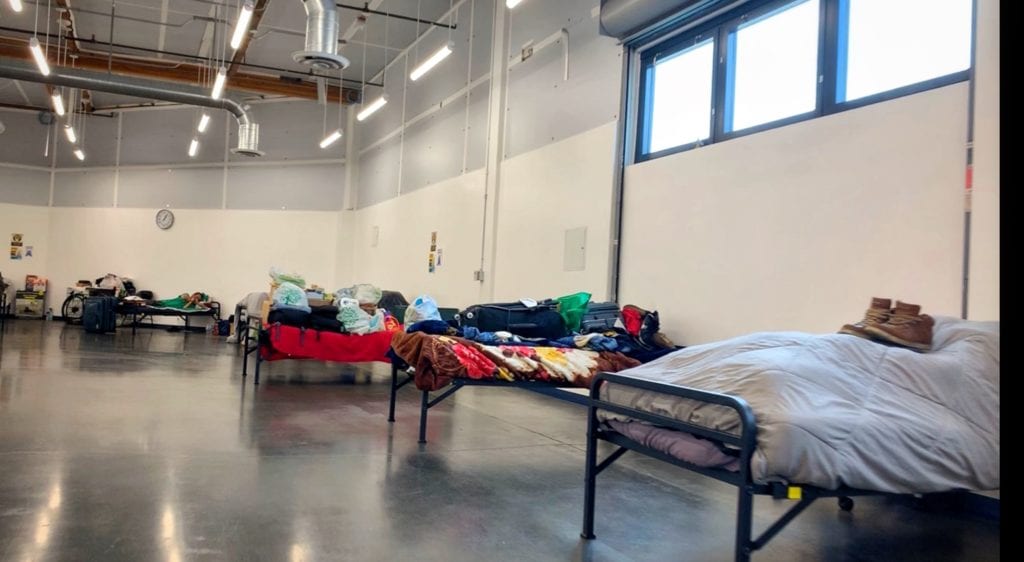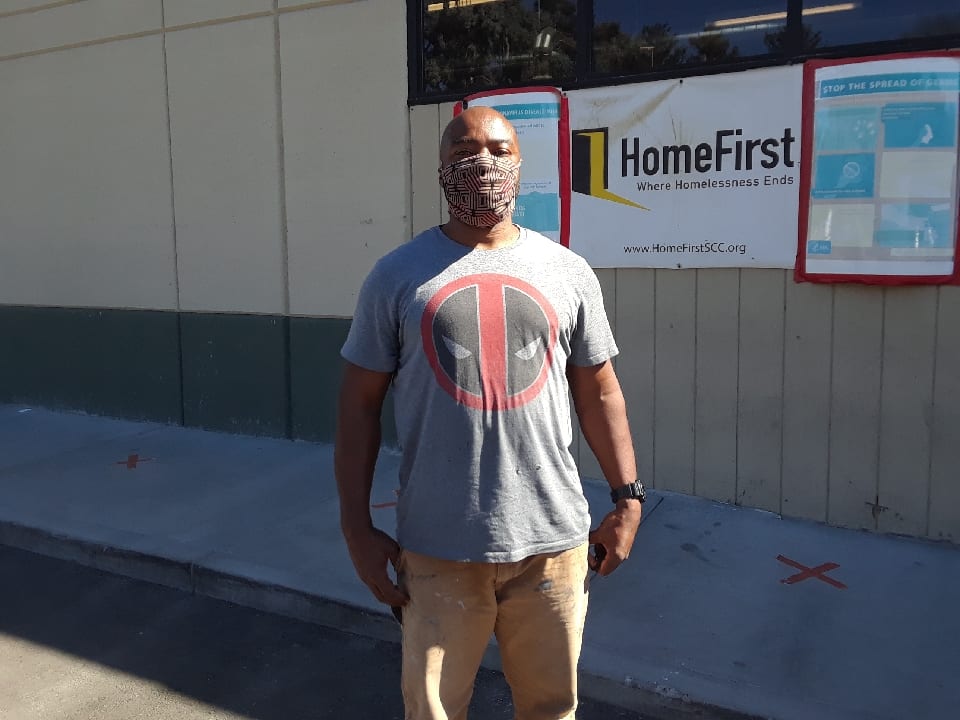An outbreak of COVID-19 infections in a county-owned shelter has prompted concerns from a homeless advocate who lives there, even though managers claim they’re following safety protocols.
The Sunnyvale Family Shelter, owned by Santa Clara County and run by nonprofit HomeFirst, saw five cases of COVID in November, HomeFirst confirmed with San José Spotlight. The shelter did not see any COVID cases between May and October amid the surge driven by the delta variant, health officials said.
Sunnyvale Clients Collaborative advocate and San José Spotlight columnist Jerome Shaw first called out the cases in his November column. He lives at the Sunnyvale shelter and works with other unhoused residents in the region.
Shaw said on-site staff have consistently failed to enforce mask mandates at the shelter for months, putting others residing and working in the shelter at risk, especially those who are older and with health conditions.
“People just didn’t feel like they had to wear their masks,” Shaw told San José Spotlight, “and once staff stopped giving out these write ups, it just got worse.”
The issue started to escalate in recent months. Shaw brought his concerns to on-site management—asking them to keep writing up those who resisted the mandate—to no avail. He then reiterated his concerns with county officials at an October meeting and in an email to HomeFirst Chief Operating Officer Rene Ramirez. The issue was brushed off, he said.
“The county is really hands off on things, even though this is a county building,” Shaw said. “They kind of just default to HomeFirst.”
HomeFirst rebutted Shaw’s claims, saying COVID safety is a top priority in the shelters it runs.
“While it is true that we have had positive cases amongst those we serve, the ratio is meager due to our teams’ diligence,” HomeFirst spokesperson Lori Smith told San José Spotlight. “This is five cases amongst a larger population of over 100 people.”
The clash between Shaw and HomeFirst comes a year after homeless shelters in Santa Clara County reported massive COVID outbreaks ahead of the 2020 holiday season. Last December, there were 67 cases reported at two homeless shelters in the area. Since then, COVID infections have been low at the shelters run by HomeFirst, according to data shared by the county health department. County officials said the Boccardo Reception Center, the largest shelter in the county with 250 beds also run by HomeFirst, saw fewer than 10 cases in July through September of this year.


Low-barrier approach
The Sunnyvale shelter operates year-round with a 175-bed capacity. Due to the pandemic, the facility has reduced its number of guests to about 100 people, HomeFirst previously told San José Spotlight.
There’s no vaccine mandate in the facility. On-site workers take temperatures of everyone staying at the shelter each time they enter. The facility offers outside dining, cleaning protocols to avoid cross-contamination and on-site COVID vaccination services, HomeFirst said.
Once inside the shelter, there’s little enforcement on preventing COVID spread—an issue driven by a shortage of on-site staff and the low-barrier policy, Shaw said.
The low-barrier policy means no one is denied services or a place to sleep, even if they’re under the influence of substances like drugs and alcohol or experience significant mental or physical health issues. Shaw said the policy appears to also include those who defy the countywide mask mandate for indoor settings.
“There was one individual where it was just ridiculous how much he wouldn’t wear his mask. They would give him a write up and he would look at it and throw it in the garbage,” Shaw said.
Shaw said he’s seen a group of people in the men’s section of the shelter who consistently failed to wear masks inside. They brushed him off when he asked them to follow the rule. On-site workers sometimes ask people keep their masks on or write them up for the violation, Shaw said, but there’s no real consequences for rule breakers.
“The lack of enforcement of the rules or the arbitrary enforcement, that’s just the way that the shelter has been running,” he said.
When the shelter discovered the COVID infections on Nov. 11, 13 people were moved in a motel to quarantine, Shaw said.


Everyone is vulnerable
HomeFirst said it worked closely with the county once the infections were confirmed, adding the nonprofit is stretched thin due to a worker shortage. The organization also said its low-barrier policy prevents harming vulnerable clients.
“Many people struggle with mental health concerns within our shelters,” Smith said. “We have to allow space for our staff to continue supporting and meeting people where they are… The option of displacing someone back to the streets because they are struggling to maintain their emotional health and comply universally with wearing a mask isn’t reducing risk— it simply makes more people vulnerable.”
Shaw said HomeFirst needs to reconsider its low-barrier approach—a policy first implemented when the shelter served as an emergency site for just adults.
“Now it’s a full-time year-round shelter with families, children, women and men,” he said, adding HomeFirst needs to enforce its rule to make the shelter safe. “There should be a certain level of professionalism in a job that you do, especially if it’s serving people that are in a vulnerable situation, but that doesn’t mean that you just roll over for them.”
Contact Tran Nguyen at [email protected] or follow @nguyenntrann on Twitter.



Leave a Reply
You must be logged in to post a comment.